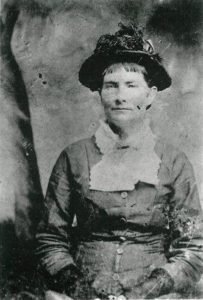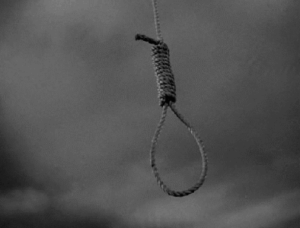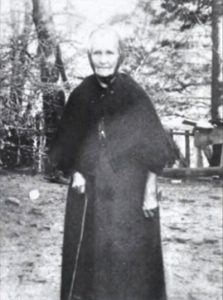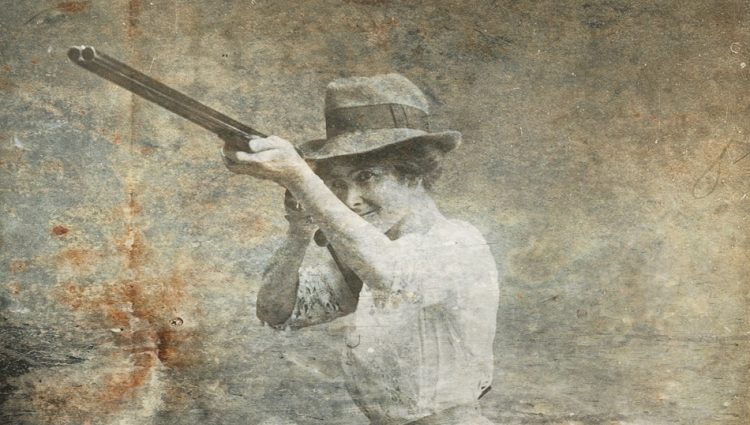**With Correction – Thank you, reader Linda, for helping to keep our Appalachian stories accurate!
I came upon “Aunt Jenny” by doing a little research about paranormal events in Appalachian states. I was quite flabbergasted after reading her story. On one hand, she was a venomous and unforgiving woman (understandably so, as we’ll come to find). On the other, she was said to be a “good Christian woman” who served her community.
If time is linear and we travel through life on a straight line from past to present to future, what happens when an event occurs that dents that line and creates a little gulley where one or more parts of us just sticks in the ditch? I call these occurrences brain breaking, or, psychologically fracturing events: war, an accident, a sudden death, a violent act, and so forth. Even one of these events has the possibility to change the trajectory of a surname’s generation. Being “stuck” in a fractured place is sometimes exacerbated by an unheard call for justice. Sometimes, a body makes her own justice. Mountain justice. And that’s just what we’ll see in “Aunt Jenny” Brooks-Johns(t)on.

Louisa Elisabeth Jane “Aunt Jenny” Bates Brooks-Johnston (aka Johnson) was born in Kentucky ** on January 22, 1826 to James and Annie Brown Bates. The Bates apparently later moved to the Appalachian part of Alabama and were quite the high-flying citizens in Jefferson and Walker Counties. Sources say Jenny had bright blue eyes and was half-Cherokee. Several Browns are listed in the Henderson Rolls Cherokee registry, but the connection can’t be made from simple research.
Jenny met a man from Kentucky named Willis Brooks and they married when she was fourteen and he was thirty-five. Willis called her “Jenny.”1)Bamagirl. 2009. “Aunt Jenny Johnson.” Aunt Jenny Johnson. March 10. The couple moved to Lawrence County, Alabama, had a gaggle of children, and ran a successful inn on the much traveled Byler Road.2)Herring, Edward. n.d. “Mountain Feuds of Aunt Jenny Johnson and the Brooks Boys.” Free State of Winston. Accessed Aug 2021. Their children were John, Angeline, Mack, Amanda, Willis Jr., Caldonie (aka Donie), Gainam, Henry, and Francis (aka Fanny).3)Sanford, Elisa. 2010. “Louisa Elisabeth Jane “Aunt Jenny” Bates Brooks – Johnston.” Find-A-Grave. March 29.4)Rachel. 2017. “Mama’s Blood Oath.” Snake and Tree. Aug 18. Life was hard, but the family rallied around one another and worked to make every day upright and better. Then . . . the Civil War arose.
A little historical backstory may be helpful here. During the Civil War, recruitments for “the South” fell sharply after autumn 1861. The Confederate Congress offered several incentives but numbers dwindled. They ultimately issued a Confederate draft whereby “all white men between the ages of 18 to 35 had to do a three-year service.”5)Gallagher, Gary W. 2020. “How did the Confederacy Enlist Soldiers During the Civil War?” The Great Courses Daily. Oct 30. The overwhelming majority of Appalachian mountainfolk opposed the war. They saw it as “a rich man’s war and a poor man’s fight.”6)Bamagirl. 2009. “Aunt Jenny Johnson.” Aunt Jenny Johnson. March 10. For the most part, they just wanted to steer clear of the conflict so they went about their mountain life. Their situations and their very survival changed rapidly once the draft came along.
The draft was one thing but exemptions were another. They fired up a poor man’s anger and resentment. At first, exemptions were few: “war production jobs, civil servants, militia officers, clergymen, and teachers with 20 students or more.”7)Gallagher, Gary W. 2020. “How did the Confederacy Enlist Soldiers During the Civil War?” The Great Courses Daily. Oct 30. Drafted men could also hire a “substitute,” i.e., pay a man (as much as 300 dollars) to take his place. This addition just stoked the fire. What mountain man could afford to hire a substitute? Another exemption was implemented in 1862 that gave white plantation owners “who had more than 20 slaves on their plantations” a pass. To make matters even worse, an “impressment” order was issued where the Confederate government took (mostly by force) food, crops, fuel, and land from people who couldn’t pay taxes. Now, the majority of mountain men eked out a living. And the majority of them didn’t have slaves. Combine these affronts, then add the part about threatened land, and you damn near have a raging bonfire. From here, let us return to “Aunt Jenny” and her husband, Willis Brooks.

The Confederate government hired men who couldn’t serve (too old, too young, disabled) to find draft-dodgers and/or seize properties and goods from the poor. This “Home Guard”8)Bamagirl. 2009. “Aunt Jenny Johnson.” Aunt Jenny Johnson. March 10. came calling at the Brooks’s inn on Byler Road. Mountain people loathed that the Confederate government funded the war with young mountain lives or their hard-earned everything. So, they joined, spied, or worked for the Union Army. Willis Brooks Sr. may have been one of those Union sympathizers.9)Gillespie, Loretta. 2016. “Part one: Setting the stage for a feud.” The Moulton Advertiser. Jan 28. Or he may have refused to pay taxes used to fund the war. Or he may have been harboring his son, John, to avoid the draft.10)Rachel. 2017. “Mama’s Blood Oath.” Snake and Tree. Aug 18. For some unknown reason, the eight hired men pointed their guns at Willis, then held, bound, and tortured him before they placed a noose around his neck, and, in front of Jenny and eight of their nine children, hung him from a tree limb in their yard. Willis Brooks was fifty-seven years old. The oldest son, seventeen-year-old John, “burst from the house to save his father”11)Bamagirl. 2009. “Aunt Jenny Johnson.” Aunt Jenny Johnson. March 10. but was shot dead by the Home Guard. The men turned toward Willis and shot holes through his dangling body. Jenny’s “home and outbuildings were destroyed by fire.”12)Rachel. 2017. “Mama’s Blood Oath.” Snake and Tree. Aug 18. Then the eight men indifferently turned and left the inn.13)Other accounts of this event differ. Rickey Butch Walker, in his writeup, “Jane (Aunt Jenny) Brooks Johnston Family of the Byler Road,” believes Yankees “in route to take the grain and meal stored at Kinlock” killed Willis Sr. and son John. Walker also presents another version where Willis Sr. actually fought in the Civil War and killed a man upon his return home who’d “harassed” Jenny while he was gone, thus causing a feud where Willis and John ended up dead.
Jenny lowered her husband and laid him near their son John. Then, she . . .
. . . gathered all the children around. Placing the boys’ hands in the sticky blood on their father’s chest — even tiny Henry’s, Jenny made them swear a “blood oath” that they would never rest until all eight of those killers were dead.14)Bamagirl. 2009. “Aunt Jenny Johnson.” Aunt Jenny Johnson. March 10.
One thing she took pride in was teaching her sons about firing guns, saying she’d “wasted many a keg of powder teachin’ my boys how to shoot!” So, did they kill the eight men? All but one. As a matter of fact, the Brooks Boys (or sometimes called the Brooks “Gang”) were ruthless gunslingers, and expert marksmen,15)Bamagirl. 2009. “Aunt Jenny Johnson.” Aunt Jenny Johnson. March 10. especially once they ventured out West in Oklahoma and Texas. The Home Guard’s leader was the first hangman to go in 1864. Jenny and her son Mack waited until he left his house and shot him from his horse. Then:
Jenny made Mack help her drag the body into the woods, where she cut off his head, but [sic] it in a burlap sack and carried it home. There, she threw it in a large boiling pot used to make lye soap and scooped and scrubbed the viscera away until she had a nice clean skull, minus the jawbone. This she used as a soap dish for the rest of her life.16)Bamagirl. 2009. “Aunt Jenny Johnson.” Aunt Jenny Johnson. March 10.
One by one, the sons successfully carried out the blood oath, hiding out in Texas or Oklahoma before and after each killing.17)Herring, Edward. n.d. “Mountain Feuds of Aunt Jenny Johnson and the Brooks Boys.” Free State of Winston. Accessed Aug 2021. The incident sparked the Brooks’s 40-year feud with various families throughout the South and West.
Other feuds were:
- Jenny remarried in 1878 to a man named Jacob Strauder “Straud” Johns(t)on. Straud’s first wife and mother of his children, Lucinda Riddle, died in 1877. His family strongly disapproved of the marriage so the stage was set for the Brooks-Riddle feud after the nuptials.
- In 1884, another fierce feud arose between the Brooks Boys and an African American family named Hubbard. The dispute was over a horse and escalated until a hail of gunfire passed between the families, ending in the death of son Gainam Brooks.18)Herring, Edward. n.d. “Mountain Feuds of Aunt Jenny Johnson and the Brooks Boys.” Free State of Winston. Accessed Aug 2021. Afterward, the Hubbards packed as much as they could carry and got out of Dodge.
- After some time (and after the mysterious death of a sheriff in Texas),19)Herring, Edward. n.d. “Mountain Feuds of Aunt Jenny Johnson and the Brooks Boys.” Free State of Winston. Accessed Aug 2021. the Brooks Boys moved to Oklahoma. Willis Brooks Jr. had a son named Thomas who was shot and killed. Willis blamed his son’s death on a group of outlaws headed by the McFarland family, but couldn’t prove it. The Brooks-McFarland feud lasted around ten years and ended in 1902 when the McFarlands orchestrated a scheme that killed George Riddle (the patsy), Willis Brooks, and his son Clifton Brooks. Willis’s son John was wounded but survived.20)Herring, Edward. n.d. “Mountain Feuds of Aunt Jenny Johnson and the Brooks Boys.” Free State of Winston. Accessed Aug 2021.

The incident that killed patriarch Willis Brooks Sr. in 1863 spawned a lifetime of Brooks retribution. The family was categorically uncompromising – no grey area for them. Only Henry, Jenny’s youngest son, lived through those feuding years. But he died from gunfire, nonetheless. He was a moonshiner and was killed by a posse of revenuers from Winston County, Alabama.
Jenny was affectionately known as “Aunt Jenny” in her old age.21)Herring, Edward. n.d. “Mountain Feuds of Aunt Jenny Johnson and the Brooks Boys.” Free State of Winston. Accessed Aug 2021. She apparently served as a “midwife to an herb doctor and was on call 24 hours a day.”22)Walker, Rickey Butch. 1995. “Jane (Aunt Jenny) Brooks Johnston Family of the Byler Road.” freestateofwinston.org. Oct. She was 98 years old when she died on March 29, 1924. The preacher asked if he could do anything else for her on her deathbed. She said she wanted to wash her hands. “And so they brought a pan of water and Aunt Jenny’s soap dish that she had made back in 1864. One last time, she washed her hands in that murderer’s skull.”23)Bamagirl. 2009. “Aunt Jenny Johnson.” Aunt Jenny Johnson. March 10.
** Featured Image of Nemours gun club – Miss M.V. Lannan, 1914 – Wikimedia
References
| ↑1, ↑6, ↑8, ↑11, ↑14, ↑15, ↑16, ↑23 | Bamagirl. 2009. “Aunt Jenny Johnson.” Aunt Jenny Johnson. March 10. |
|---|---|
| ↑2, ↑17, ↑18, ↑19, ↑20, ↑21 | Herring, Edward. n.d. “Mountain Feuds of Aunt Jenny Johnson and the Brooks Boys.” Free State of Winston. Accessed Aug 2021. |
| ↑3 | Sanford, Elisa. 2010. “Louisa Elisabeth Jane “Aunt Jenny” Bates Brooks – Johnston.” Find-A-Grave. March 29. |
| ↑4, ↑10, ↑12 | Rachel. 2017. “Mama’s Blood Oath.” Snake and Tree. Aug 18. |
| ↑5, ↑7 | Gallagher, Gary W. 2020. “How did the Confederacy Enlist Soldiers During the Civil War?” The Great Courses Daily. Oct 30. |
| ↑9 | Gillespie, Loretta. 2016. “Part one: Setting the stage for a feud.” The Moulton Advertiser. Jan 28. |
| ↑13 | Other accounts of this event differ. Rickey Butch Walker, in his writeup, “Jane (Aunt Jenny) Brooks Johnston Family of the Byler Road,” believes Yankees “in route to take the grain and meal stored at Kinlock” killed Willis Sr. and son John. Walker also presents another version where Willis Sr. actually fought in the Civil War and killed a man upon his return home who’d “harassed” Jenny while he was gone, thus causing a feud where Willis and John ended up dead. |
| ↑22 | Walker, Rickey Butch. 1995. “Jane (Aunt Jenny) Brooks Johnston Family of the Byler Road.” freestateofwinston.org. Oct. |






Great story and string of events in this tale. Well written!
Thank you, Mary! She was quite the strong woman, for sure.
I just saw her grave marker and it states that she was born in Kentucky. Look on YouTube for the channel Faces of the Forgotten. He told her story and went to her grave site.
Thank you so much, Linda. I have no idea what happened there but I am so grateful that you let us know. As you see, we’ve corrected the mistake and credited you with that change. Thanks again and keep reading!
I love the story. I live 22 miles from her old home and where she was laid to rest. Me and my family have visited these places several times over the years and i once recall one night our radio started changing channels on its own. Then we looked in the back window and seen a big blue ball floating and following us out. Orb like light. Weather its the ghost of Aunt Jenny Johnson i will always respect her taking up for her family. Those were times when you traded blood for blood. God Bless.
I love the story of my Aunt Jenny! I’m her great, great granddaughter. She adopted my great grandmother Edna Brooks who married Pappaw Emmet Fischer. My mother took me to her gravesite for the first time last week and it was really awesome to see. I’m proud to be related to such a strong woman.